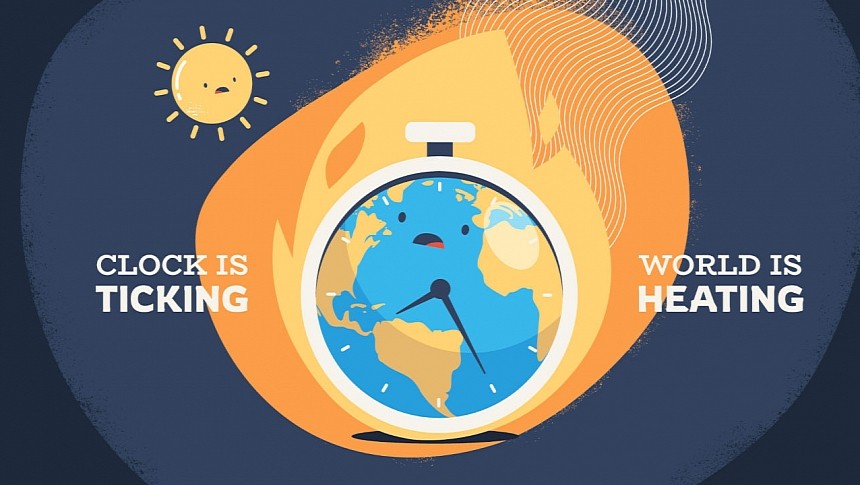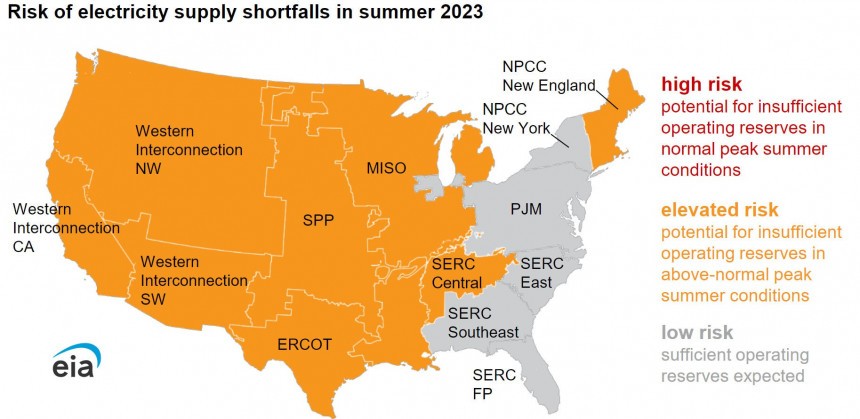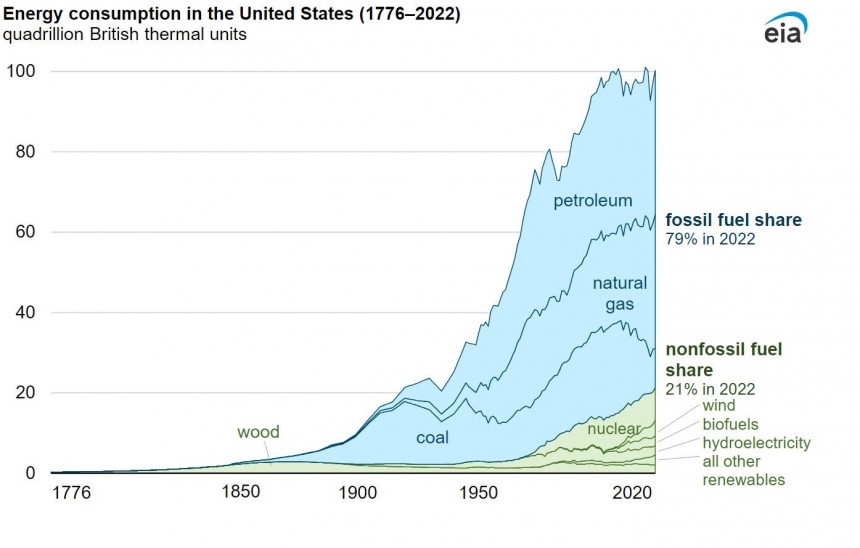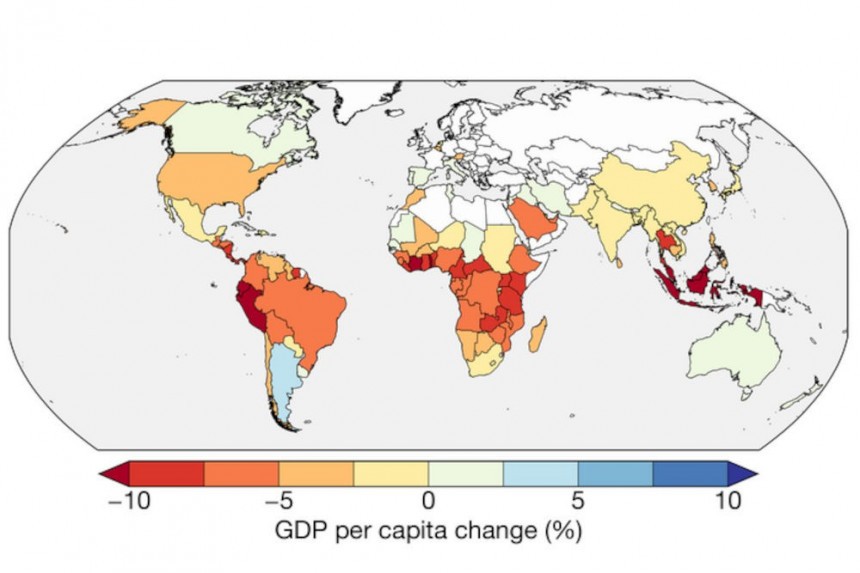It's already two weeks since "The Hottest Day Ever!" headlines sparked across the world's mass media, while social media was abundant on conspiracy theories about who's to blame. Unfortunately, despite scientific evidence (and consensus) that human pollution is one of the main drivers, if not the biggest culprit, popular wisdom continues to blame other factors and ignore our fossil fuels dependence.
No matter what side you are on, there's no doubt that Earth is getting hotter, and there's a direct correlation between the CO2 concentration in the air and rising temperatures. Humanity can't stop or even reverse that process anymore. We had a few windows of opportunity in the last two or three decades. But we, the sum of all societies living on this planet, couldn't act as one and implement the best solutions to avoid the worst-case scenario.
As a result, for a few days, we were worried about temperature records. But then this "Breaking News" was replaced by cute kittens on Facebook, new dumb short videos on TikTok and Instagram, and other hot subjects on mainstream media. Funny how people understand "hot" these days, huh?
On July 4, the news was that Monday, July 3, was the hottest day according to the US National Centers for Environmental Prediction. The record was broken in the following two days because of the El Niño phenomenon, a sum of meteorological and environmental factors that led to Pacific Ocean warming. It's the opposite of El Niña, which "hides" global warming because it cools the ocean a little.
At this point, you could argue that temperature records are because of natural fluctuations in Earth's ecosystem, so there's no proof that human activities are to blame. Well, there's plenty of evidence, but you must know to understand them. Or at least to trust scientists who do understand what's going on. Which is futile if you believe in the "Climate change is a hoax!" propaganda.
Whether you're one of Greta's enthusiasts or one of Trump's followers, the trend is crystal clear: the Earth's average temperature is rising. As a result, the "Mad Max" harsh environment scenarios are becoming more and more plausible, so it's time to prepare the next generations for survival on this planet.
Not thriving, not everyday living, but survival. Because heat is a b*tch.
Last summer, North American Electric Reliability Corporation warned that two-thirds of North America is at risk of energy shortfalls "if temperatures spike" this summer. We now know that "if" is out of the question and the "when" is already here.
The heat waves have two significant consequences. As temperatures rise, everybody turns up the air conditioning. Every person needs to cool down at home, in offices and depots, in cars and trains. Using so many air conditioning devices at the same time puts severe pressure on the grid. On the other hand, power plants are plagued by heat-related issues, and thus outages are more often. It's a perfect nightmare: the highest electricity demand meets the reduced supply. As a result, energy shortfalls are inevitable.
Despite the temperature records we recently witnessed, remember the saying that went viral: "It's the coldest summer of the rest of our lives." Oh, and 2023 is only the first of the few years the El Niño cycle lasts. So, expect higher average temperatures by 2025-2026. And I think you can imagine the trend will not go down afterward.
Consequently, more problems for the grid, as electric car sales are on the rise. If air conditioning puts two-thirds of the country at risk, what can you expect from EVs? Maybe you heard Elon's recent joke about the U.S. objective of 60% of new car sales being EVs in 2030: "Why not 69%?" (wink-wink). Even if all new cars sold in 2030 will be electric, the share of all the EVs in the U.S. will merely be 10-15% of the entire nation's fleet.
But the grid's problems will be exponential by then. If – and that's a freakin' big IF – investments in the electricity infrastructure stall. By now, many petrolheads out there, I'm sure, are thrilled to hear me blaming the EVs. But I'm not doing this. I'm only raising concerns about the grid's slow transition to a resilient one. This is likely a nation's priority. For any country in the world, as a matter of fact.
What's a resilient grid, you ask? It's one designed to use nonfossil fuel energy sources. According to the US EIA's Monthly Energy Review, in 2022, the energy consumption in the U.S. used 21% of nonfossil fuel energy sources. It's the highest percentage (and a tie to 2020) since the early 1900s, but there's still a very long road to a zero-carbon grid.
Today, the world uses roughly 12% of renewables for energy production. By 2030, the percentage could be 30%, according to a new report from Rocky Mountain Institute and Bezos Earth Fund. Consequently, fossil fuels share is expected to fall from 70% to around 40%; or even 30%, in the best-case scenario. But I'm already fed up with these "best-case scenario" assertions.
In the following years, until the end of this decade, humanity will still use vast amounts of fossil fuels. Their pollution and CO2 will only add to present levels and drive a significant increase in Earth's temperatures, impacting the global economy in many ways.
A recent Science report from Dartmouth College shares a grim picture of the economic environment in a hotter world. According to their analysis, the financial toll of the El Niño phenomenon is trillions of dollars because of dramatic changes in weather resulting in floods, droughts, fires, and biosphere harm at levels much higher than in previous decades.
Researchers concluded that the global economy lost $4.1 trillion in the half-decade following the '82-'83 El Niño and $5.7 trillion, respectively, following the '97-'98 El Niño. Suppose the world somehow reduces CO2 emissions so that in 2100 the global average temperature will increase by no more than 2 °C compared to pre-industrial levels. In that case, experts predict that global economic losses for the 21st century will amount to $84 trillion.
But the chance for the 2°C scenario to happen is slimmer by the day, so I can't imagine how the global economy could look like in a hotter world, where El Niño effects will be exponential. Can you imagine thousands of trillion losses? I think you can kiss the global economy bye-bye.
It's more likely that in a couple of decades, the world is heading for a zombie-apocalypse-like scenario where everybody will fight for scarce resources. Mainly water, because recently scientists discovered an intriguing effect of global warming. It seems that the water cycle is disrupted, and more water remains in the atmosphere as vapors than the water that returns to Earth as rain, filling up the underground reservoirs.
Moreover, oceans are slightly turning greenish because of changes in the plankton, which is the basis for all life on the planet. This is to say, the 2009 economic crisis, and the 2019 Covid-19 pandemic, were just mere hiccups compared to the water and food crisis magnitude that some expect by the half of this century.
At this point, I know I sound crazy or like a conspiracy theorist. But I'm not either one. I simply gather information from reliable sources and try to understand the basis for the predictions. In the last twenty years or so, I witnessed many exciting evolutions of technology and many pledges and promises for a bright future and a zero-emissions society.
Today, I only see business as usual in a world dominated by Big Oil's interests. I also see the technological breakthroughs, the visionary people, and the increasing will of new generations to be more sustainable. But unfortunately, we don't see the forest because of the trees. Or, more accurately, many of us choose to ignore forest burning because it's much more comfortable not to look up (pun intended).
In the end, I bet on the extinction of our society. Not necessarily of the human race; I don't know what Evolution will look like. But I'm afraid the current way of living – in a lovely apartment or house, driving a nice car, wearing nice clothes and traveling to nice places, eating nice meals and beverages – will soon be over. Call me a sorry-ass pessimistic; tell me I'm wrong to think like that; give me a reason to change my mind.
As a result, for a few days, we were worried about temperature records. But then this "Breaking News" was replaced by cute kittens on Facebook, new dumb short videos on TikTok and Instagram, and other hot subjects on mainstream media. Funny how people understand "hot" these days, huh?
On July 4, the news was that Monday, July 3, was the hottest day according to the US National Centers for Environmental Prediction. The record was broken in the following two days because of the El Niño phenomenon, a sum of meteorological and environmental factors that led to Pacific Ocean warming. It's the opposite of El Niña, which "hides" global warming because it cools the ocean a little.
At this point, you could argue that temperature records are because of natural fluctuations in Earth's ecosystem, so there's no proof that human activities are to blame. Well, there's plenty of evidence, but you must know to understand them. Or at least to trust scientists who do understand what's going on. Which is futile if you believe in the "Climate change is a hoax!" propaganda.
Whether you're one of Greta's enthusiasts or one of Trump's followers, the trend is crystal clear: the Earth's average temperature is rising. As a result, the "Mad Max" harsh environment scenarios are becoming more and more plausible, so it's time to prepare the next generations for survival on this planet.
Not thriving, not everyday living, but survival. Because heat is a b*tch.
Last summer, North American Electric Reliability Corporation warned that two-thirds of North America is at risk of energy shortfalls "if temperatures spike" this summer. We now know that "if" is out of the question and the "when" is already here.
Despite the temperature records we recently witnessed, remember the saying that went viral: "It's the coldest summer of the rest of our lives." Oh, and 2023 is only the first of the few years the El Niño cycle lasts. So, expect higher average temperatures by 2025-2026. And I think you can imagine the trend will not go down afterward.
Consequently, more problems for the grid, as electric car sales are on the rise. If air conditioning puts two-thirds of the country at risk, what can you expect from EVs? Maybe you heard Elon's recent joke about the U.S. objective of 60% of new car sales being EVs in 2030: "Why not 69%?" (wink-wink). Even if all new cars sold in 2030 will be electric, the share of all the EVs in the U.S. will merely be 10-15% of the entire nation's fleet.
But the grid's problems will be exponential by then. If – and that's a freakin' big IF – investments in the electricity infrastructure stall. By now, many petrolheads out there, I'm sure, are thrilled to hear me blaming the EVs. But I'm not doing this. I'm only raising concerns about the grid's slow transition to a resilient one. This is likely a nation's priority. For any country in the world, as a matter of fact.
What's a resilient grid, you ask? It's one designed to use nonfossil fuel energy sources. According to the US EIA's Monthly Energy Review, in 2022, the energy consumption in the U.S. used 21% of nonfossil fuel energy sources. It's the highest percentage (and a tie to 2020) since the early 1900s, but there's still a very long road to a zero-carbon grid.
In the following years, until the end of this decade, humanity will still use vast amounts of fossil fuels. Their pollution and CO2 will only add to present levels and drive a significant increase in Earth's temperatures, impacting the global economy in many ways.
A recent Science report from Dartmouth College shares a grim picture of the economic environment in a hotter world. According to their analysis, the financial toll of the El Niño phenomenon is trillions of dollars because of dramatic changes in weather resulting in floods, droughts, fires, and biosphere harm at levels much higher than in previous decades.
Researchers concluded that the global economy lost $4.1 trillion in the half-decade following the '82-'83 El Niño and $5.7 trillion, respectively, following the '97-'98 El Niño. Suppose the world somehow reduces CO2 emissions so that in 2100 the global average temperature will increase by no more than 2 °C compared to pre-industrial levels. In that case, experts predict that global economic losses for the 21st century will amount to $84 trillion.
But the chance for the 2°C scenario to happen is slimmer by the day, so I can't imagine how the global economy could look like in a hotter world, where El Niño effects will be exponential. Can you imagine thousands of trillion losses? I think you can kiss the global economy bye-bye.
Moreover, oceans are slightly turning greenish because of changes in the plankton, which is the basis for all life on the planet. This is to say, the 2009 economic crisis, and the 2019 Covid-19 pandemic, were just mere hiccups compared to the water and food crisis magnitude that some expect by the half of this century.
At this point, I know I sound crazy or like a conspiracy theorist. But I'm not either one. I simply gather information from reliable sources and try to understand the basis for the predictions. In the last twenty years or so, I witnessed many exciting evolutions of technology and many pledges and promises for a bright future and a zero-emissions society.
Today, I only see business as usual in a world dominated by Big Oil's interests. I also see the technological breakthroughs, the visionary people, and the increasing will of new generations to be more sustainable. But unfortunately, we don't see the forest because of the trees. Or, more accurately, many of us choose to ignore forest burning because it's much more comfortable not to look up (pun intended).
In the end, I bet on the extinction of our society. Not necessarily of the human race; I don't know what Evolution will look like. But I'm afraid the current way of living – in a lovely apartment or house, driving a nice car, wearing nice clothes and traveling to nice places, eating nice meals and beverages – will soon be over. Call me a sorry-ass pessimistic; tell me I'm wrong to think like that; give me a reason to change my mind.









